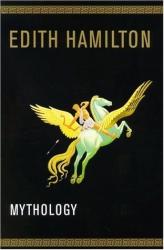
Mythology, written about Edith Hamilton, creates a timeline and family tree of the Greek gods and demigods. The book is based in small sections, so it is essentially a collection of assorted stories. For example, there is a section called "The Great Heroes before the Trojan War", and in that section there are specific synopsizes on Perseus, Theseus, Hercules, and Atlanta. I enjoyed the book because you can read it 5 minutes at a time because it does not take long to read a section. I recommend the book to mythology and history lovers alike.
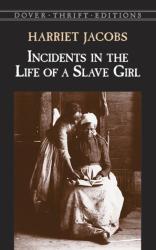
Incidents in the Life of a Slave Girl, written by Harriet Jacobs, is a memoir of the oppression of slavery that Harriet faced as a slave. The book starts off talking about the pleasantries of childhood, but when her owner dies, ownership of her is shipped over to Dr. Flint, who ends up being a predator and wants to procreate with Harriet. Harriet refuses, but Dr. Flint becomes so demanding that Harriet turns fugitive. Ironically, Harriet hides for seven years at her grandmother's house, just across the street from Dr. Flint's plantation. Eventually, an opportunity arises for her to escape North, and after doubts, she does and is successful. In the North, she works hard to bring her family out of slavery, and one of the ladies that she works for purchases her and sets her free. The tale is brathtaking story of relentless perseverance, grit, and tenacity.
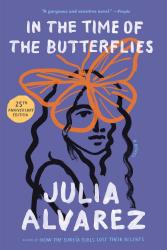
In the Time of the Butterflies by Julia Alvarez is a fictionalized account of resistance to the dictatorial rule in the Dominican Republic inspired by the stories of the three Mirabal sisters who were murdered in 1960. Alvarez expertly captures the terrorized atmosphere of living in a police state and the courage of a few to stand up in resistance. Despite the underlying anguish and dread, the novel is brimming with romance, hope, and faith as Dominicans try to find life under a dictator. Suppose you want a captivating novel enriched with courage, feminism, and intimacy and are willing to read a challenging narrative to stomach. In that case, this anxious page-turner will not disappoint.
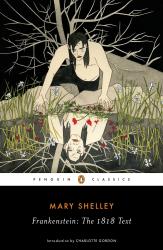
Frankenstein, a fictitious novel based Europe, details the account of a genius named Victor Frankenstein who creates a beast out of dead body parts. The beast then goes on to haunt him and kill everyone who Frankenstein loves. Frankenstein tracks the beast into the mountains and eventually speaks to him. The beast pleads Frankenstein to create a female beast, to which Frankenstein, comprehending of the horror that a lineage of beasts would survive, declines. The beast vows to kill every last one of Frankenstein's affections, and he does. Frankenstein is enraged and dedicated the rest of his life to tracking and killing the beast. The chase ends in the Arctic, where Frankenstein eventually dies. The beast sees his death and, with no more hope for a future mate, is overcome with grief.
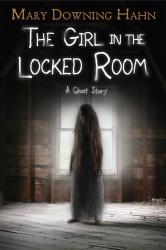
The Girl in the Locked Room is a ghost story written by Mary Downing Hahn. In a nutshell, this book is based on a strange girl who has been locked in a small room for many years. As the story goes on, many secrets unfold and all questions are answered with shocking twists.
I enjoyed the plot of this story. As simple as the setting is many secrets unfold throughout the book. The character (the girl) is extremely complex even though the setting is small. This isn’t my favorite novel by Mary Downing Hahn, but it is definitely worth reading in my eyes.
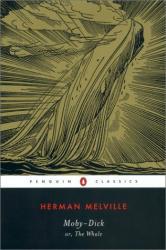
I, like most people, got wildly bored reading this book. Even then, it's one of my favorites. Moby Dick is a long and treacherous journey not for the faint of will, but lying at the end of the mud-covered path is a handsome bounty. For me, the ending of Moby Dick justified the means. Sprinkled throughout are interesting and bizarre chapters (and wise quotes on sleeping with drunken cannibals), but I believe the impact of the ending cannot be achieved without Moby Dick's arduous length. The hundreds of pages allow the reader to spend a massive amount of time with the characters (even if it's just Ishmael) and grow to appreciate the ship. Without that, the ending would fall miserably flat. So, despite the time it takes to read Moby Dick, the famous tale of a captain's monomania is one told beautifully.

No Longer Human is a cultural phenomenon, widely known as the second most bestselling novel in the history of Japan. Within, Osamu Dazai explores the life of a man who feels that he has never been a part of humanity, and his desperate strivings to find a piece of happiness in a life full of terror and vice. The timeless, existential themes of the novel will haunt the reader past the last page.
I chose to read this book because I'd seen a lot of people all over the internet praise it as the saddest book they'd ever read. There are about a thousand videos and essays and think pieces about the depressing nature of this book, and how it can devastate and eviscerate emotionally. Weirdly enough, I don't see it. The book is definitely very sad, but to me it didn't extend very far beyond the other grimly written books about very sad people with very sad lives. However, the psychology of the protagonist definitely sets the book apart. Unlike other books of the same nature, this book cuts to the bone by showing the terrifying underbelly of humanity. The protagonist is paralyzed by fear because he comprehends what many of us forget: that we are at all times surrounded by our own apex predators. Each of us has our own deep desires that could stir us to violence at any given time. We lie and cheat and steal to get what we want, effortlessly wearing masks that can obscure our entire character and can last a lifetime. The protagonist isn't like other antiheroes of hardened books about the horribleness of humanity. He doesn't accept it, or rail against it. He is very much afraid of it, and does everything he can to get out of its way. The protagonist's perspective is also interesting in the way it views humanity. The detachment of the central character is clinical, and portrays the characters in an alien light. He is scared of humans, but he also doesn't understand them. He sees all hunger and desire as something strange, and he wonders how people can be so insincere so easily. But despite his abject horror of humanity, the protagonist is slowly transformed into everything he despises and cannot understand. Perhaps the most fascinating part of this tale is how the protagonist is dragged, slowly but steadily, into the grips of humanity's vices and horrors.
Despite the intriguing nature of the protagonist's psychology, I didn't find the rest of the book as interesting as I thought I would. I was likely just disappointed that after all the build up, this amounted to another very well done, very sad bildungsroman in the vein of Catcher in the Rye or Little Friends. There's also issues with the way the writer portrays women, but since everyone in the book is fairly dehumanized it doesn't bother me as much as I thought it would. All in all, No Longer Human is a fascinating journey through the most base natures of humanity, all through the eyes of a man who feels disqualified from being human. I'd recommend this to someone who wants something dark and strangely fascinating. I would not recommend this to anyone who is anywhere close to being in a bad place, or anyone who got annoyed by Holden in Catcher in the Rye. This guy is ten times worse.
Reviewer Grade: 12
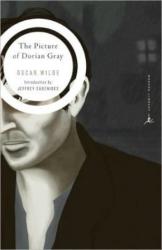
As a lover of writing, poetry, and pretentious philosophical tangents on the measurements of good art, I was bound to enjoy Wilde's only novel. The Picture of Dorian Gray is a beautiful tapestry of tragic corruption and its devastating effects. Albeit at times Lord Henry seems to ramble on about entirely uninteresting subjects, the overall experience of the book is short and sweet. The prose is flowery and elegant; the interactions between characters are brief but natural. Major character development occurs off-screen, which was disappointing, but within 160 pages one can only fit so much. Ultimately, I greatly enjoyed the ride, and The Picture of Dorian Gray has cemented itself as one of my favorites.
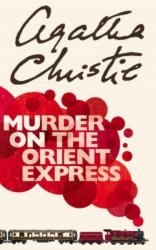
Murder on the Orient Express is a compelling Christie mystery. The book is steady and methodical: after the initial inciting incident, each of the passengers are questioned in order. Then, the evidence is reviewed and the conclusion comes easily to the detective. This novel was a straightforward, easy read, but I found it was better enjoyed by just sitting back and reading. Formulating theories, from the perspective of the reader, is relatively difficult due to key details being under developed when first introduced in the book. Therefore, the detective is better informed than the reader throughout the mystery, which took away some of the intrigue for me. Ultimately, however, the ending was satisfying, and Murder on the Orient Express is a well-written, captivating read.
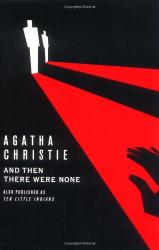
Any fan of mysteries should read And Then There Were None because it is such a wonderfully refreshing book. It is understandable why the book continues to have an impact decades after its release. Following And Then There Were None is not that difficult. Yes, it's a mystery, so pay attention (or at least keep track of who's passing and when), but the book doesn't aim to mislead its readers with unusual text. Guilt and justice are two of And Then There Were None's themes. Every visitor taken to the island is charged with an unfounded murder. As the death toll climbs, visitors struggle in various ways with their own personal emotions of guilt. Justice Wargrave's confession clarifies the notion of justice. Those who loved And There Were None like me should read more of Agatha Christie's work or if you want to read a book similar to And Then There Were None I recommend The Guest List by Lucy Foley. Overall, I loved Agatha Christie's novel And Then There Were None because of how it always kept readers on the edge.
Grade: 8th
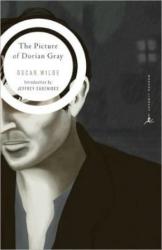
At first, I only picked this book as a classic for school, but I quickly learned it's a classic for a reason. I'd known of the general plot of the novel where a portrait reveals the ugliness of the inside of a man while he remains young, but the way it's written and described makes the full story. The story starts with painter Basil basically putting so much work and devotion into a portrait of Dorian Gray, the painting comes to life. Dorian wishes to stay forever young, and the painting reflects his evilness (vanity, etc.). I enjoyed the sense of mysticism and how everything connects to the theme of appearances are not what they seem. Dorian looks beautiful, but his actions (the thing that makes a person) are grotesque and horrid. The gothic fiction genre is reflected by the dark evilness of Dorian's actions and the magic of the portrait. This book is my favorite class I read this year and the plot surprised me with the characters always returning and a sense of incompletedness when characters leave. If you're looking for a medium-read classic with thought-provoking ideas, then this is for you!
Reviewer Grade 12
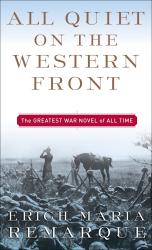
All Quiet on the Western Front by Erich Maria Remarque can solely be described as an ingenious masterpiece. The book, a historical fiction novel, was written in 1928 about German soldiers' experiences during World War I; Remarque used his experiences as a german soldier to accurately portray the terror of war. The main characters, Paul Bäumer, Albert Kropp, Franz Müller, and Ludwig Behm, are remarkably realistic and, throughout the book, go through changes caused by the nature of war, essentially turned into humans run by animal instincts. Throughout the book, Remarque ripes away any possible notion of romantic ideas relating to war and perfectly encapsulates the true terror of war. Overall, I wholeheartedly believe that everyone should read this masterpiece.
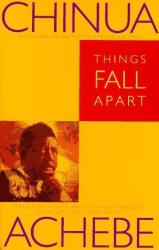
Things Fall Apart by Chinua Achebe is considered a literary masterpiece, with its unique perspective on colonization that isn't always told. Okonkwo, the main character with three wives and the memorable reputation of a great wrestler, has a great fear of losing any part of this status and ending up like his father. This fear is realized when Okonkwo is exiled (for an ironic crime) and returns to find his community overrun by Christian missionaries. They bring a seemingly-noble message of salvation, but it is only a matter of time before blood is spilt. Learning about Ibo culture through this book was a really cool experience, so I don't regret reading it. But, why is it that "classics" always have to include raging misogyny? Okonkwo almost constantly beat his wives, and despite this technically being historically accurate, I found the repetitiveness to be unnecessary. Despite this, Achebe's use of language, such as proverbs to create a story that feels like a fable, was something that I haven't seen before. Gaining a new perspective throughout reading Things Fall Apart was an experience I think everyone should have.
Grade 12
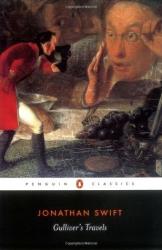
Part of the reason I rated this book low is because I had high expectations. I read an abridged version as a kid and I thought the general story was cool. Part of the reason I rated this book low is because Swift fills the reader's head with unnecessary details until important plot points are lost in the middle of description paragraphs. The events that take place in Gulliver's Travels are interesting, sometimes clever references to 19th century politics and general social commentary: Gulliver passes through a variety of islands with caricatured citizens. Although I do not expect Gulliver or the citizens of these islands to be developed characters, as their only purpose is to serve as a means to tell the story, the intrigue of the plot dissolves when paired with Swift's writing style. Swift is a meticulous writer who insists on heavy descriptions of every detail and, consequently, there is little to no stylistic separation between key points in the story and the personal life of a particular citizen. Gulliver's Travels is also a relatively short read at around 300 pages, so it is fast-paced compared to other books written in similar detail, which further muddies the plot. The dialogue in this book is also near nonexistent; I can't recall a single line. When Swift means to relay information between characters, he will most often do so in paragraph format. As someone who usually enjoys classics, I am disappointed to say I really only valued the skeletal plot outline rather than the book itself.
Grade: 11
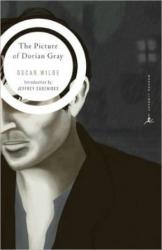
Imagine what could happen, if people possessed magic mirrors that reflected not their faces, but their souls? Dorian Gray, from the novel by Oscar Wilde, gets a chance to fully experience it.
An artist, Basil Hallward, paints an incredibly realistic portrait of an even more incredibly handsome young man. As he’s still innocent, the picture reflects just his appearance, but later, when Dorian starts doing cruel and ugly things, the portrait begins changing too. Every sin, every crime against the other human reflects on the face on the canvas, adding more and more ugly wrinkles, spots and ulcers. His own face, however, stays unaltered, always fresh and young. The portrait shows not what he looks like, but what he truly is. Finally, when Dorian kills the artist, he reveals the picture and the face of an old disgusting man on it.
The entire transformation proves what a high price one has to pay in order to realize his wish to stay young and attractive all the time. Under the influence of his old friend, Dorian loses his life guides and devotes his time to looking for new enjoyments. He does not understand that true beauty comes from the inside. It’s not necessarily visible. It’s not on your face, it’s in your thoughts, words and actions.
The novel is written in magical realism, so even the most incredible plot turns feel like something natural. It involves from the first page and makes the readers go through all the transformations together with the main characters.
Reviewer Grade: 11
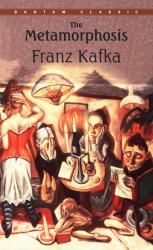
One morning he woke up and discovered himself being a beetle. Not the best beginning of the day for sure. The worst part was that he had to live in the insect's body till the end of his life.
The immediate problems that Gregor faced, such as being unable to get out of his bed, would’ve perhaps been amusing, if he was not afraid of his family’s and boss’s reaction that much. “I will be late for my train to work!” I wish that was my biggest worry if I turned into a beetle. Panic, helplessness and pettiness that he exuded were so strong that I could feel it surrounding me. Written in Kafka’s original style, all the emotions and perceptions are strong and relatable, which makes even the most impossible action seem realistic.
The novel starts hurting, when Gregor notices how strongly his family’s attitude towards him has changed. They all are disgusted with a new creature in Gregor’s bedroom (which we can’t really judge them for). Grete, his sister, seems to be the only one who still believes that her brother’s mind and soul are captured in the beetle’s body and tries her best to take care of the huge insect. As the time goes, Gregor’s behavior changes a lot. His thoughts become more of beetle’s as well as his tastes. Having some rotten food for dinner? Delicious!
The way that he describes the new vision of the world around him, opens a lot of hidden information and evokes true sympathy and sorrow for his fate.
The novella leaves a lot to think about. The transformation that happened to the main character can be interpreted in different ways as well as the changes that his family members go through, trying to adjust to a new life with a human-size beetle living in their house.
Metamorphosis is a great choice for those who feel like they’re living an insect life and their routine is just a big dung ball that they have to push forward all the time.
Reviewer Grade: 11
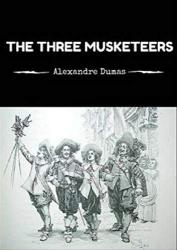
Despite its lack of general theme, Dumas' The Three Musketeers is a beloved classic. The story follows a young man D'Artagnan as he serves under M. de Treville, the head of the French king's musketeers (Athos, Porthos, and Aramis). As he spends more time with the musketeers, D'Artagnan is caught up in the convoluted politics of the king and jealous cardinal. Somehow, however, in the epic tale of adventure, companionship, romance, and betrayal, Dumas' message is lost to the fast-paced plot. His use of dialogue is masterful in creating realistic suspense between characters; not in all 600+ pages is there a dull moment. Overall, however, The Three Musketeers is best read for an interesting story and nothing else. The main cast is well-developed and serve as contrasts to each other. Although the plot itself is well-constructed, the events lack any greater relationship to each other beyond causation. When I picked this book up, I expected the adventure to follow some sort of formula to parallel D'Artagnan's personality; his personality, however, has little impact on the general plot. Dumas' talent in diction and ability to tell a story is evident, and The Three Musketeers was an enjoyable read, as long as you know what to expect.
Grade: 11
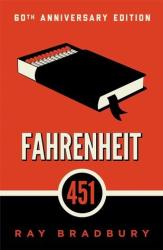
451͒ Fahrenheit is the temperature when paper starts burning. Guy Monteg knows it for sure. He’s a fireman. However, his job is not to put out the fire, but to make it and burn the books. He likes his job, but there is something that he hides from everyone, including his wife.
From every fire, Guy saves a book. In his society, books are forbidden, as they are considered to make people unhappy, evolving complicated emotions and making the readers think. No books means no worries, but a careless life, full of joy and simple entertainment.
One day, Guy Monteg decides that he does not want to live like he used to anymore. He finds a former English professor and asks to teach him to understand what he reads about. Together, they make a plan to save more books in the hope that war will destroy the existing system that they have to live in.
But any secret becomes clear, and the next night Guy gets an order to burn his own house. He destroys it with a flamethrower, as well as his captain, co-workers and the Mechanical Hound.
Monteg escapes. He does not know though, that after all the dangers on his way, he will finally find his destination and meet those whom he will belong to.
It may be hard to feel, but the book is sharp and straightforward. Through the adventure in a fictional universe, Ray Bradbury shows us what might happen, if humanity keeps moving in a direction that will only satisfy basic needs and bring momentary pleasures. I’m sure, some of us can already recognize ourselves with shame in Beatty or Mildred. We’ve already made that first step on the path to the world, where people burn books. This dystopia teaches us that we can always make a difference in the world and change our lives the way that we believe is right. There will be those who will try to destroy you, but there will also be those, whom you will be able to rely on.
The novel creates a tense engaging atmosphere, where you can smell threat in the air and hear the chase behind your back. It does not let the reader go till the very end and stays in mind days after.
Reviewer Grade: 11
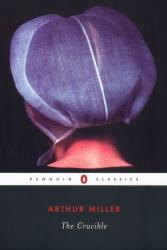
Hysteria, spreading throughout Salem, Massachusetts in the 17th century. Teenage girls, being accused of witchcraft for dancing in the woods. A puppet with a needle that can cost someone’s life. Agreeing on execution in order to protect the good name for your family. Mass trials on people being suspected of doing magic. Sounds crazy? Welcome to the world of The Crucible.
The play by Arthur Miller takes us to Salem in a period of witch trials. Everything starts pretty prosaic: a girl named Abigail wants to get love from a local farmer, John Proctor. As it often happens, she finds a love potion the easiest way to reach the desirable goal, however, she, her friends and the family slave Tituba get caught on doing this ritual late at night.
Nobody wants to be punished. Nobody will believe a slave over his own daughter or niece. Considering these two statements, Abigail decides to avoid a punishment by accusing Tituba and the entire list of other women in a town of being witches.
And here is when things start to go heels overhead. Like a huge snowball that captures everything that is on its way, panic enhances more and more people around. Men and women are being executed for no true reason. Even an expert in demonology is invited to take part in the case. And in all this chaos Abigail makes another attempt to get a chance for a future together with John Proctor.
The action develops dynamically in the play, and the characters add more tension to the plot with their bright personalities. You can’t stay indifferent. You either love or, more likely, hate them. A lot of situation are ironic and absurd, however, the play tastes bitter, when you realize how many people had to struggle because of someone’s stupid wish and lack of responsibility.
The book refers a lot to the time of McCarthyism, which had impacted the author’s life in particular. It makes a strong impact on the audience, especially, in the end, and leaves the readers with a lot of questions: Do people change? Is reputation worth sacrificing your life? Whom to believe and what to deny?
Reviewer Grade: 11
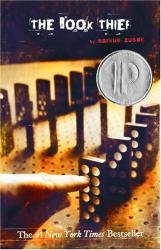
The Book Thief starts in January 1939, in Nazi Germany. The main character, Liesel, was traveling on a train with her mother and brother when her brother suddenly dies. Liesel was only nine at the time, and the wound that was inflicted then, she would bear forever. At her brother's burial site, she stole a book for the first time, earning her the name "The Book Thief". Her story is told from the perspective of Death, who is depicted as an immortal being with feelings and a heart.
Liesel then traveled to Himmel Street, where she lived with her foster parents for the remainder of the book. Liesel made new friends, finds a family, and overcomes the grief caused by her brother's passing there. But most importantly, she discovered the power and impact of words there. The power of words is the central theme or message of The Book Thief.
Throughout the book, Liesel steals more books and becomes braver and more mature. Initially, she was a child who didn't know about all the beauty and ugliness in the world. But as the plot developed, she experienced more of the brutality of WW2 and found her role in her community. After she learned to read, she started to spread the love that was caused by words to her neighbors, by reading out loud during air raids. She also learned to love and understand people better.
The author, Markus Zusak, used the symbolism of colors to illustrate a picture of the world that Liesel lived in. For example, when Death described a scene, the sky was always a different color or texture. When describing a bloody battlefield, the sky was described as plasticky, to show the stillness and emptiness that was caused by the death of soldiers.
I highly recommend this book to readers looking for a thought-provoking and intense book. Liesel's and the other characters' lives were presented in a very relatable way, which will make readers question their own attitudes on life and the world.
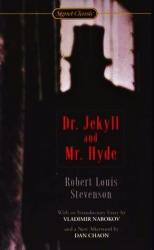
This book was alright. I had to read this for school once and actually quite enjoyed it. This is a great book for anyone who likes quick mystery reads. The plot is one that makes the reader want to continue reading! The book is about a mysterious doctor named Dr. Jekyll. Jekyll is a well respected man but awfully strange. If this sounds interesting I suggest reading it! Yes, it wasn’t my favorite, but I enjoyed the mysterious plot.
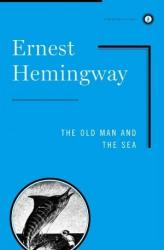
The story of Win and Loss, one of Ernest Hemingway’s most famous works, The Old Man and the Sea introduces us to a fisherman Santiago. He is old, but he has determination and a goal. He wants to catch his Big Fish. He does not give up even after eighty four days of failure and on the eighty-fifth day luck finally smiles at him. Big Fish is on the hook. Three days of confrontation between the fishermen and the fish reveal Santiago’s incredible inner strength and will power. But when he finally comes back to his hut, exhausted and barely alive, he’s left only with a skeleton of his dream and a poor illusion of a better life.
The deep symbols that the story contains can be interpreted in many different ways. Some of the readers may find the old man’s hunt as a waste of effort on a goal that is not worth risking his life. Others, however, will discover Santiago as their role model and an example of undefeatable human nature and endurance on the way to the dream. But this controversy and ambiguity is exactly what makes the book so unique and attractive to the generations of readers.
The language of the novella is typical for all Hemingway's books, simple and straightforward, however, this time the symbolic meaning is hidden under the coat of realistic story. It encourages the reader to think and reflect on the pages that he’s read and on his own life as well and find his own interpretation of the fisherman’s story.
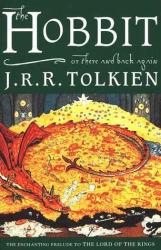
If you are looking forward to diving into the fascinating world of dwarves, wizards and elves and feel ready to fight evil wolves, man-eating trolls and a fire-breathing dragon Smaug, then The Hobbit by J. R. R. Tolkien is definitely for you. A warm children’s fantasy novel, which, however, will captivate the hearts of many adults, takes you to the atmosphere of fairy tales that you were listening to by the fireplace as a kid.
The main character, hobbit Bilbo, at first reminds us of ourselves. He, as all the hobbits are supposed to do, loves eating good food, spending time at home and making their houses cute and cozy. However, his routine crashed as a dropped pot, when a wizard Gendalf knocked at his door. Welcoming him inside, Bilbo could not even imagine that soon he would go on a true adventure all the way to the Lonely Mountain and save an ancient treasure from the claws of a furious dragon. On his way he will meet many different creatures, make friends and enemies, defeat mountain trolls, get captured by giant spiders, get into another captivity right after that, outplay Gollum in the caves and get the magical ring. But what is more important, Bilbo will turn into a brave warrior (what a shame for the entire generations of hobbits!) and a loyal companion.
The author's writing style and original universe makes it impossible to stay indifferent to the story. Kind and soft narration wraps you as an old blanket and keeps you cozy even in the coldest evenings. Younger readers, as well as their parents, will find many life lessons on the pages of The Hobbit, such as why it is important to make smart choices, appreciate your friendships and be ready to help those who are in trouble. The book is an awesome pick for both family time and independent reading.
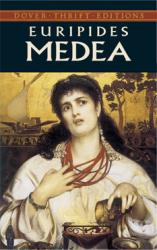
Medea by Euripides is a play about a princess in Greek mythology. She is betrayed by her husband when he weds another woman and Medea vows to take revenge. She plans to hurt everyone who hurt her, but by doing this she puts people who did her no wrong at risk. Will she end up getting revenge and living out her days or will she join the same fate that she curses down upon? I recommend this book to anybody who is into Greek mythology or would like to get into it. This is a fast read of about 50 pages.
Jaala 12
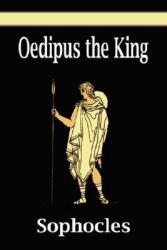
Oedipus the King by Sophocles is a Greek play that follows the tragedy and downfall of this King. He is presented by a messenger that a disease has spread across his land and he needs to save his people. He sets out in search of this issue, but slowly comes to the realization that this something is a someone within his borders. What if this someone who needs to be eradicated is one who governs it? I would recommend this book to anybody who likes Greek mythology or the adventure genre.
Jaala 12
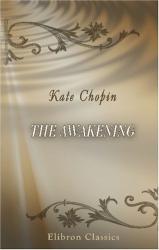
The Awakening by Kate Chopin is a fictional novel that questions what it is to be an independent woman in a male dominant society. Edna lives in the Creole society in New Orleans that values the idea of women being a housewife. Edna strays away from this ideal and attempts to break the boundaries of what women think and can do. Is Edna strong enough to break these barriers or will the barriers break her? I recommend this novel to anybody who loves twists and turns and what it truly means to be independent.
Jaala 12

I chose this book because I had watched the movie and was curious as to how the book was in comparison. I found that both were great overall and I don't dislike one more than the other, but the book felt more mature than the movie. Overall I really did enjoy this book, the detail in the book was a great touch, as well as was relatable. Personally, I felt a connection to some of the characters having to leave for college and trying to get the best possible score on the SAT. There is only one thing I did not enjoy about this book though, which is that there is a lot of smoking. The smoking feels a bit excessive, especially when the book follows a freshman in high school, so the amount of smoking I feel like does not portray a true aspect of what that would look like in real life. I would recommend this book to an upper teenage audience since there are mature topics such as brief sexual scenes and smoking. I gave this book 4 stars since I felt like it was very well written and an enjoyable book to read; the deduction of one star was due to the portrayal of smoking. This is honestly a great read that I personally love, I would definitely recommend it!
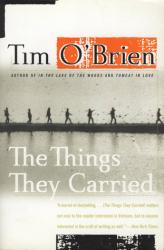
The Things They Carried is an interesting narrative about a group of soldiers as they navigate the horrors of the Vietnam War. Each chapter is fairly short and tends to have a lot of action or interesting commentary, so it was pretty engaging. What I didn't love, though, was the author's combination of realism and fiction. He used his own name as the main character, but experienced fake scenarios with people who never existed. It was sometimes frustrating, not knowing what was real or not. O'Brien was a soldier in the war, but he said that fictional war stories are a way for him to convey important messages of courage without reliving the trauma of his actual experiences. This is a unique genre, so it's worth a try if you like realistic fiction.
Grade 12
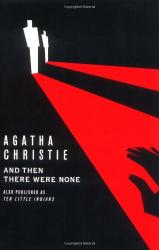
Ten strangers are mysteriously summoned to an isolated island... where murder awaits. Agatha Christie crafted an intricate web of betrayal and suspense, a must-read for any avid bookworm. This read was completely unpredictable - everyone was a suspect until the final, jaw-dropping reveal. The setup, the characters, and the gripping plot made this the best murder mystery I have read in years. With its trademark twists and a chilling ending, no one should miss out on the masterpiece of And Then There Were None.
Grade 11
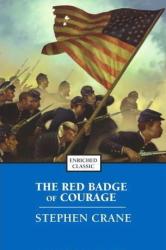
This book was a fascinating piece of literature. The author described war in more of a psychological format, as in the effect of war upon the mind, then a physical format. It reminded me of Robert A. Heinlein's Starship Troopers in its attention to the mind of a soldier. Many Civil War veterans would get a shock meeting Mr. Crane because they thought he had been in the Civil War when he hadn't. It was interesting how Crane referred to the main character, Henry Fleming, as "the youth". He uses similar naming for the other characters, like "the tall soldier," and "the friend." I enjoyed the book, and I'm impressed at how Crane, according to actual soldiers, so acutely described war on a minute-to-minute basis, when at the time of writing, he hadn't ever been in battle. This book almost felt like an experiment of Crane's, like he was just exploring new ideas. The result was international fame and a famous landmark of American fiction.
Reviewer Grade: 9